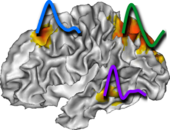pyhrf.stats.random module¶
-
class
pyhrf.stats.random.BetaGenerator(mean=0.5, var=0.1)¶ Bases:
pyhrf.stats.random.RandomGeneratorClass encapsulating the beta random generator of numpy
-
generate(size)¶
-
-
class
pyhrf.stats.random.GammaGenerator(mean=1.0, var=1.0)¶ Bases:
pyhrf.stats.random.RandomGeneratorClass encapsulating the gamma random generator of numpy
-
generate(size)¶
-
-
class
pyhrf.stats.random.GaussianGenerator(mean=0.0, var=1.0)¶ Bases:
pyhrf.stats.random.RandomGeneratorClass encapsulating the gaussian random generator of numpy
-
generate(size)¶
-
-
class
pyhrf.stats.random.IndependentMixtureLaw(states, generators)¶ Class handling the generation of values following an indenpendent mixture law. Requires the prior generator of label values.
-
generate()¶ Generate realisations of the mixture law.
-
-
class
pyhrf.stats.random.LogNormalGenerator(meanLogN=1.0, varLogN=1.0)¶ Bases:
pyhrf.stats.random.RandomGeneratorClass encapsulating the log normal generator of numpy
-
generate(size)¶
-
-
class
pyhrf.stats.random.RandomGenerator¶ B Abstract class to ensure the definition of the function generate.
-
generate(size)¶
-
-
class
pyhrf.stats.random.UniformGenerator(minV=0.0, maxV=1.0)¶ Bases:
pyhrf.stats.random.RandomGeneratorClass encapsulating the random generator
-
generate(size)¶
-
-
class
pyhrf.stats.random.ZeroGenerator¶ Bases:
pyhrf.stats.random.RandomGeneratorClass encapsulating the null distribution !!!!!!!!!
-
generate(size)¶
-
-
pyhrf.stats.random.gm_sample(means, variances, props, n=1)¶
-
pyhrf.stats.random.rand(d0, d1, ..., dn)¶ Random values in a given shape.
Create an array of the given shape and populate it with random samples from a uniform distribution over
[0, 1).Parameters: d1, ..., dn (d0,) – The dimensions of the returned array, should all be positive. If no argument is given a single Python float is returned. Returns: out – Random values. Return type: ndarray, shape (d0, d1, ..., dn)See also
random()Notes
This is a convenience function. If you want an interface that takes a shape-tuple as the first argument, refer to np.random.random_sample .
Examples
>>> np.random.rand(3,2) array([[ 0.14022471, 0.96360618], #random [ 0.37601032, 0.25528411], #random [ 0.49313049, 0.94909878]]) #random
-
pyhrf.stats.random.randn(d0, d1, ..., dn)¶ Return a sample (or samples) from the “standard normal” distribution.
If positive, int_like or int-convertible arguments are provided, randn generates an array of shape
(d0, d1, ..., dn), filled with random floats sampled from a univariate “normal” (Gaussian) distribution of mean 0 and variance 1 (if any of the are
floats, they are first converted to integers by truncation). A single
float randomly sampled from the distribution is returned if no
argument is provided.
are
floats, they are first converted to integers by truncation). A single
float randomly sampled from the distribution is returned if no
argument is provided.This is a convenience function. If you want an interface that takes a tuple as the first argument, use numpy.random.standard_normal instead.
Parameters: d1, ..., dn (d0,) – The dimensions of the returned array, should be all positive. If no argument is given a single Python float is returned. Returns: Z – A (d0, d1, ..., dn)-shaped array of floating-point samples from the standard normal distribution, or a single such float if no parameters were supplied.Return type: ndarray or float See also
random.standard_normal()- Similar, but takes a tuple as its argument.
Notes
For random samples from
 , use:
, use:sigma * np.random.randn(...) + muExamples
>>> np.random.randn() 2.1923875335537315 #random
Two-by-four array of samples from N(3, 6.25):
>>> 2.5 * np.random.randn(2, 4) + 3 array([[-4.49401501, 4.00950034, -1.81814867, 7.29718677], #random [ 0.39924804, 4.68456316, 4.99394529, 4.84057254]]) #random
-
pyhrf.stats.random.rpnorm(n, m, s)¶ Random numbers from the positive normal distribution. rpnorm(n,m,s) is a vector of length n with random entries, generated from a positive normal distribution with mean m and standard deviation s.
Original matlab code from: (c) Vincent Mazet, 06/2005 Centre de Recherche en Automatique de Nancy, France vincent.mazet@cran.uhp-nancy.fr
Reference: V. Mazet, D. Brie, J. Idier, ‘Simulation of Positive Normal Variables using several Proposal Distributions’, IEEE Workshop Statistical Signal Processing 2005, july 17-20 2005, Bordeaux, France.
Adapted by Thomas VINCENT: thomas.vincent@cea.fr
-
pyhrf.stats.random.truncRandn(size, mu=0.0, sigma=1.0, a=0.0, b=inf)¶


